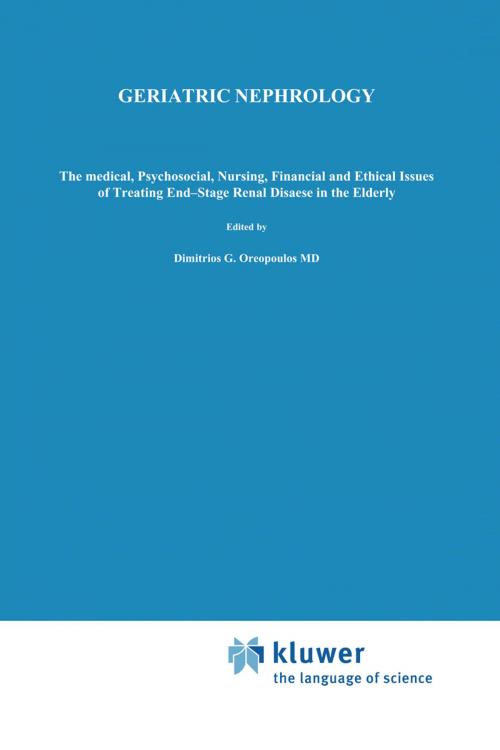Geriatric Nephrology
The medical, psychosocial, nursing, financial and ethical issues of treating end-stage renal disease in the elderly
Nonfiction, Health & Well Being, Medical, Specialties, Internal Medicine, Nephrology, Geriatrics| Author: | ISBN: | 9789400942554 | |
| Publisher: | Springer Netherlands | Publication: | December 6, 2012 |
| Imprint: | Springer | Language: | English |
| Author: | |
| ISBN: | 9789400942554 |
| Publisher: | Springer Netherlands |
| Publication: | December 6, 2012 |
| Imprint: | Springer |
| Language: | English |
The year was 1943. As a third-year medical student at Stanford, I was about to witness the beginning of a medical miracle. Dr. Arthur Bloomfield, Professor of Medicine, had selected my patient, a middle aged man, who was dying of acute pneumococcal pneumonia, as one of the first patients to receive miniscule doses (by today's standards) of his meagre supply of a new drug - penicillin. The patient's response amazed everyone especially this impressionable medical student. The rest of the story is history. With one stroke, the introduction of penicillin removed from the medical scene the 'friend of the aged' - lobar pneumonia. The consequences, which no one could have imagined at the time, are still becoming manifest as other 'miracles' such as respirators, artificial kidneys and many potent new antibiotics have come upon the scene. All of us are aware that these miracles have created a variety of new challenges around the states of dying and near dying. We have no easy answers for these problems. Nevertheless as dialysis techniques, especially CAPD, are applied more widely to the treatment of the elderly, the task of helping the patient meet death with dignity becomes increasingly important and vexing because once begun, dialysis is difficult to terminate.
The year was 1943. As a third-year medical student at Stanford, I was about to witness the beginning of a medical miracle. Dr. Arthur Bloomfield, Professor of Medicine, had selected my patient, a middle aged man, who was dying of acute pneumococcal pneumonia, as one of the first patients to receive miniscule doses (by today's standards) of his meagre supply of a new drug - penicillin. The patient's response amazed everyone especially this impressionable medical student. The rest of the story is history. With one stroke, the introduction of penicillin removed from the medical scene the 'friend of the aged' - lobar pneumonia. The consequences, which no one could have imagined at the time, are still becoming manifest as other 'miracles' such as respirators, artificial kidneys and many potent new antibiotics have come upon the scene. All of us are aware that these miracles have created a variety of new challenges around the states of dying and near dying. We have no easy answers for these problems. Nevertheless as dialysis techniques, especially CAPD, are applied more widely to the treatment of the elderly, the task of helping the patient meet death with dignity becomes increasingly important and vexing because once begun, dialysis is difficult to terminate.















